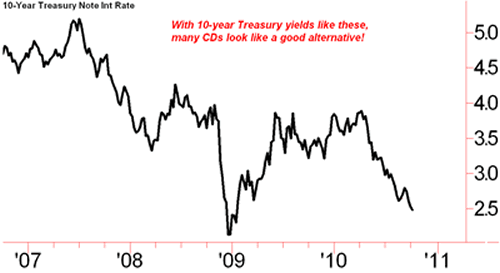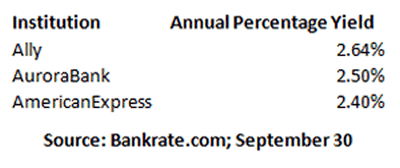Why Certificates of Deposit (CD's) are More Attractive than U.S. Treasury Bonds Today
Interest-Rates / US Bonds Oct 05, 2010 - 08:23 AM GMTBy: Nilus_Mattive
 Last week I told you why many mutual fund investors could be setting themselves up for serious losses in Treasury bonds.
Last week I told you why many mutual fund investors could be setting themselves up for serious losses in Treasury bonds.
Just to recap — the idea was that mutual funds often buy and sell before their bonds reach maturity, which can translate to big losses for fund holders if interest rates rise. And the upshot was that, if you wanted to truly guarantee against any type of loss, you would have to hold individual bonds to maturity.
Of course, if your goal is absolute safety … and you’re already willing to accept the relatively low yields being offered by long-term Treasury bonds right now … then I want to give you something else to think about today:
Many Certificates of Deposit Are Currently Yielding MORE Than Treasuries … And Locking Up Your Money for LESS Time in the Process!
Make no mistake: In nearly all cases, I continue to favor dividend-paying stocks over Treasuries or CDs in income portfolios, especially in this low-rate environment.
However, I also believe in diversification. I recognize that many investors aren’t willing to accept any risk at all these days. They might be okay with parking some of their money in a government-guaranteed account for a couple percent a year.
|
And if any of the above applies to you, I encourage you to take another look at the staple of banks and credit unions across the nation — the lowly Certificate of Deposit (CDs).
Available from financial institutions around the country, CDs lock up a fixed amount of money for a fixed period of time, and pay you interest in the process. Generally speaking:
- Interest payments are fixed for the life of the CD, though some CDs do offer variable rates,
- Interest payments move up with longer terms and higher deposit amounts,
- And smaller institutions pay better rates than large banks.
In nearly all cases, your principal and interest are guaranteed by a government agency — either the Federal Deposit Insurance Corporation (FDIC) if your CD is with a bank or the National Credit Union Share Insurance Fund if the issuer is a credit union. (You should still make sure that the issuing institution is covered by one of these agencies before you purchase anything!)
Assuming your CD is covered, there is currently a maximum insured amount of $250,000 per owner or depositor at any given financial institution. But since the chain of dominoes ends at the U.S. government, an insured CD offers practically the same level of safety as holding a Treasury until maturity. In either case, only a complete federal government default would hand you a loss of principal.
The downside to CDs is that earned interest is subject to both state and federal taxes while interest on Treasuries is exempt at the state level.
CDs are also considered harder to unload than Treasuries. That’s because, while CDs can be bought and sold just like bonds, their secondary market is nowhere near as liquid.
Regardless, you can always redeem your CD before maturity … you will simply be penalized for doing so (generally by forfeiting a portion of the interest). These penalties are spelled out before you commit any money.
There are plenty of other intricacies that can arise with CDs, of course — including call provisions (which allow the issuing institution to buy back your CD before it matures). But if you stick to plain-vanilla varieties, things are very straightforward.
Now, let’s take a look at what some plain-vanilla, five-year, fixed-rate CDs were recently offering in the way of interest:
|
All three of the issuers above are insured by the FDIC … and although their yields are factoring in reinvestment of the interest received over the life of the CD, these rates are still extremely competitive with the current yield on a TEN-YEAR Treasury bond (2.5 percent as of yesterday).
So let me summarize: With these CDs, you can get the same implicit government guarantee. You can commit your money for half the time. And you can get a similar interest rate in the process.
Mind you, those are just basic nationally-available rates on standard deposits. If you want to put away larger amounts of money, issuers like USAA and Discover Bank are offering rates as high as 2.75 percent for “jumbo” five-year CDs
And if you look locally, you can probably find even better deals. In the last week I’ve seen credit unions offering seven-year CDs with annual percentage yields as high as 3.49 percent. You’d be getting a full percentage point more in interest with three less years of commitment!
So even if you’re placing the utmost importance on protection of your principal, I still think it pays to do your homework and look beyond the world of long-term Treasuries right now.
Sincerely,
Nilus
This investment news is brought to you by Money and Markets. Money and Markets is a free daily investment newsletter from Martin D. Weiss and Weiss Research analysts offering the latest investing news and financial insights for the stock market, including tips and advice on investing in gold, energy and oil. Dr. Weiss is a leader in the fields of investing, interest rates, financial safety and economic forecasting. To view archives or subscribe, visit http://www.moneyandmarkets.com.
© 2005-2022 http://www.MarketOracle.co.uk - The Market Oracle is a FREE Daily Financial Markets Analysis & Forecasting online publication.





